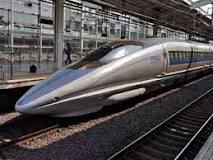In an ambitious step toward transforming Nigeria’s transportation landscape, the long-awaited Lagos-Abuja High-Speed Bullet Train project is set to reduce travel time between Nigeria’s two largest cities from 12 hours to just three hours. This move is expected to revolutionize inter-city travel, bringing significant economic benefits and improving overall infrastructure across the country.
The visionary project, which promises to reshape the travel experience between Lagos and Abuja, will be powered by a combination of private sector investment and public-private partnerships. Geofocus Consortium, a key partner in the development, is leading the project, with the construction phase already on the horizon. Engineer Yinka Idris, Director of Operations at Geofocus, shared details of the project in a statement issued on Tuesday.
“This project is a true milestone in Nigeria’s infrastructure development,” Idris stated. “It is a significant leap forward that will address several challenges faced by travelers today—especially the long travel times, unsafe roads, and low productivity.” According to Idris, the bullet train will offer a much-needed alternative to road travel, ensuring that Nigerians can move between Lagos and Abuja with greater speed and safety.
The Lagos-Abuja corridor is currently a major bottleneck for commuters and businesses alike, with road travel often marred by long hours in traffic, safety risks, and fluctuating road conditions. The bullet train, which will cut the 12-hour journey down to an estimated 2-3 hours, offers an efficient, fast, and environmentally friendly mode of transport.
Idris commended President Bola Tinubu’s administration for prioritizing infrastructure development as a means of fostering economic growth and addressing critical challenges. “This project is a perfect example of how Nigeria’s leadership is harnessing the power of the private sector to create modern infrastructure without straining the public purse,” he added.
In a statement, President Tinubu’s office confirmed that the Lagos-Abuja bullet train aligns with the administration’s broader vision of economic diversification and sustainable development. “The partnership between the public and private sectors on this ambitious initiative underscores our commitment to modernizing Nigeria’s infrastructure and boosting the national economy.”
The new bullet train will not only ease transportation but will also have a lasting impact on Nigeria’s economy. Idris emphasized that the project would support both local and international trade by fostering smoother logistics, reducing transport costs, and making Nigerian markets more competitive globally.
More than just a rail service, the Lagos-Abuja bullet train project also envisions the development of “smart cities” along the rail corridor. According to the plan, ten smart cities will be built, each with approximately 10,000 housing units. These cities are designed to be technologically advanced, sustainable, and capable of housing the growing population that will be attracted to the region as a result of the enhanced connectivity.
“The creation of these smart cities will create a ripple effect that extends beyond just the rail service,” Idris explained. “These cities will be centers of innovation, business, and social development, playing a pivotal role in Nigeria’s growth.” Along with the smart cities, an independent power plant will be built to supply the necessary energy for the train and surrounding infrastructure, ensuring sustainability and operational efficiency.
The Lagos-Abuja bullet train is expected to generate thousands of jobs during its construction phase and afterward. According to Idris, the project will employ a significant workforce in various sectors, including construction, engineering, and maintenance, thereby contributing to the reduction of Nigeria’s unemployment rate. “This initiative is not only a boon for transportation; it will create thousands of jobs and boost local economies along the rail route,” he said.
However, before construction can begin, the project still requires official approvals from key regulatory bodies, including the Infrastructure Concession Regulatory Commission (ICRC) and the Federal Executive Council (FEC). Idris confirmed that feasibility studies had already been completed, and the funds for the project are secured. The construction phase is expected to last between 48 and 52 months, with the first phase of the rail network set to open in the coming years.
The bullet train is expected to become Nigeria’s largest-ever Public-Private Partnership (PPP) infrastructure project and will set a new benchmark for rail transport across Africa. This initiative is seen as a model for future PPP-driven infrastructure projects that could address Nigeria’s transportation woes and ease pressure on the country’s overstretched highways.
The environmental benefits of the project are also substantial. “By providing a cleaner alternative to road travel, we expect a significant reduction in road congestion and carbon emissions,” Idris noted. This, in turn, would help extend the lifespan of Nigeria’s roads and reduce the maintenance burden on the government. Furthermore, the energy-efficient nature of the bullet train aligns with global efforts to promote sustainable transportation options.
As the dream of high-speed rail travel in Nigeria inches closer to reality, the implications for the country’s broader infrastructure goals are profound. With the backing of the government and private sector, Nigeria is poised to join a select group of countries that boast world-class rail networks, strengthening its economic position in Africa and globally.
For Nigerians who endure the grueling hours spent on the road between Lagos and Abuja, the promise of a swift, modern rail alternative represents a welcome change. With the completion of the bullet train, Idris believes the project will ultimately create a seamless travel experience, contributing to a higher quality of life and enhanced business opportunities for Nigerians.
“As we continue to move toward the completion of this game-changing project, citizens can look forward to faster travel, greater safety, and a boost to economic prosperity across the nation,” Idris said in conclusion. “Under President Tinubu’s leadership, this represents not just a new era for transportation in Nigeria but a brighter future for the entire nation.”

